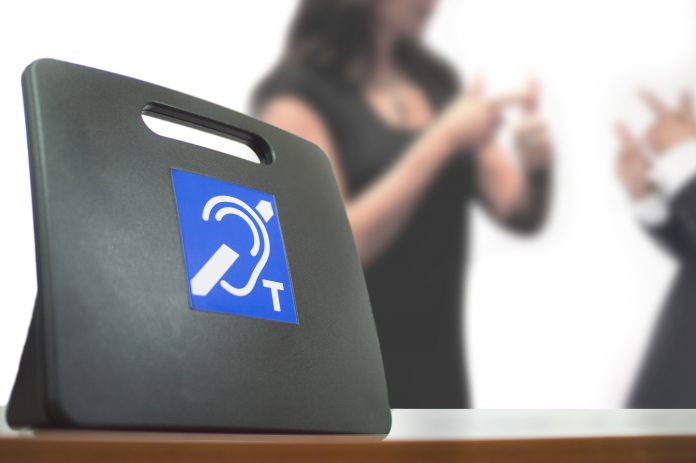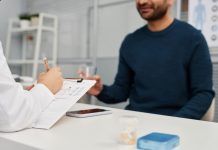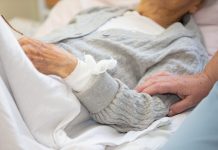Clare Vale, Managing Director of Sign Solutions, discusses how COVID-19 has highlighted the need for better access to health services for the Deaf community
The constant new barrage of developments regarding the coronavirus outbreak has left most people feeling anxious about their own health, the health of family members and friends and the impact the virus will have on their lives.
As the world grapples with a once-in-a-generation public health crisis that has already claimed more than 178,000 lives worldwide, the Deaf community is facing communication barriers that make it even harder for them and their families to navigate the pandemic.
Lack of information
When the government gave its first coronavirus updates, the needs of Deaf and hard of hearing people were not taken into consideration in official communications. Press conferences had no interpreters present, leading to an uproar in the Deaf community and furious lobbying to the Department of Health and Social Care until interpreters were provided for every briefing.
Further down the line there continued to be problems, for example, the TV adverts outlining key COVID-19 advice on things like washing hands, social distancing and coughing into your elbow contained no interpreters, leaving some Deaf people misunderstanding information. Some were unaware of the need to wash hands for 20 seconds, and others thought social distancing was only required if people had symptoms.
An ongoing problem
Unfortunately, this lack of access to vital health information is nothing new for the community, and the pandemic has only served to highlight the continuing barriers faced by Deaf and hard of hearing people, as they struggle to keep abreast of developments.
Many studies report that Deaf patients encounter severe communication barriers when accessing health services. It is a shocking fact that Deaf people are more likely to suffer ill health than other people, simply because it is harder for them to use the health services that many of us take for granted. Deaf people are twice as likely to have high blood pressure, four times more likely to develop diabetes and generally have a reduced life expectancy (1).
Furthermore, a worrying NHS report shows that 44% of Deaf patients found the last contact with their GP or health centre to be difficult or very difficult, compared with only 17% from a general population patient survey (2).
Generally, healthcare professionals are not given the necessary support to care for Deaf patients which is worrying, since inadequate communication may lead to wrong diagnoses and misguided treatment. These communication barriers amplify global health emergencies like the pandemic for people who are Deaf or hard of hearing.
Adequate care is a right
One can only hope the current pandemic and the light it has shone on the obstacles Deaf people face will help place the community’s needs firmly on the agenda.
This is not a big ask – adequate access to health services is a civil right. Under the Human Rights Act, health practitioners and staff must establish effective communication with patients with hearing loss as part of their human rights.
The government needs to find optimum strategies to integrate Deaf peoples’ needs into primary health care systems and ensure they are given information in a way they can understand. In large-scale research about the preferred communication mode of Deaf and hard of hearing people in clinical settings in the UK, 50% of the sign language users preferred to communicate via sign language interpreters (3).
There are many tools that can be put in place now to improve access for Deaf people, even as we face more time in lockdown and in-person medical consultations are being kept to a minimum.
Video British Sign Language interpretation, for example, can be implemented to remove the communication barriers for Deaf patients and give them the freedom to access the services provided by their local NHS trust remotely.
Video interpretation has been commissioned for many years, however, the government and NHS have so far been slow to move forward with the implementation despite the clear benefits.
Not only can video help minimise the admin time for clinics, but it can also reduce the costs associated with cancelled face-to-face appointments, which can be rescheduled to take place virtually. Video is also available for short notice, non-complex emergency requirements and ensures Deaf patients can communicate straight away without delay and from the comfort of their home.
Change is needed
Overall, the coronavirus pandemic has brought to the forefront the truth about the lack of access to medical services for the Deaf and hard of hearing, showing that change is needed.
The virus does not discriminate among people, and the response from the government and healthcare officials must not either. By learning from previous shortcomings and employing the correct measures, they can eliminate these entirely avoidable issues and bring the communication problems Deaf people have to battle against to an end.
References
(1) London.gov.uk, 2015
(2) British Journal of General Practice, 2015
(3) The Journal of Deaf Studies and Deaf Education, Volume 21, Issue 1, January 2016











